Nestled in the Blue Ridge Mountains of North Carolina, is a well-kept secret that I am about to reveal. Shankara Ayurveda Spa at the Art of Living Retreat Center is a pristine destination for those who want a short getaway. We were so excited to find this secret retreat; it was the perfect wholistic experience for us.
Located in the Blue Ridge Mountains
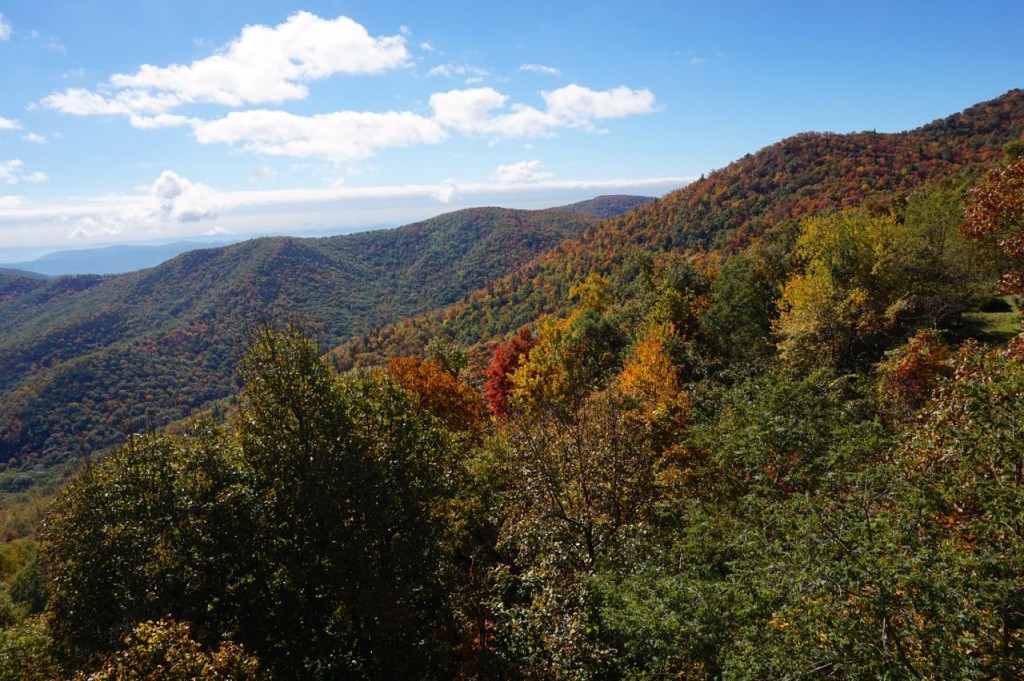
Blue Ridge Mountains
October is the best time to drive through Blue Ridge Parkway and watch the leaves turn into shades of yellow, orange, and red. As you go up in the High Country, watch the valleys unfold beneath you and fill in your lungs with refreshing crisp mountain air. Perched up on the mountain on a private reserve, only a few minutes outside the city of Boone, NC, is The Art of Living Retreat Center.
The Art Of Living Retreat Center
Originally built in the mid-1990s as a transcendental meditation center, the place was abandoned, auctioned, and later rebuilt as one of the largest retreats in the country.
In October 2011, the Art of Living Retreat Center opened its 381 acres after lots of renovations, and now offers a hotel, spa, restaurant, apartments, organic garden, pottery center, and halls that can be rented out for weddings, conferences, retreats, and workshops.
The retreat’s parent organization is Art of Living Foundation, the world’s largest volunteer-based non-profit organization, that was founded in 1981 by India’s spiritual leader, Sri Sri Ravi Shankar. The Foundation conducts “Art of Living” stress-relief courses, based on yoga, breathing, and meditation, and offers a variety of personal-development and trauma-relief programs around the world.
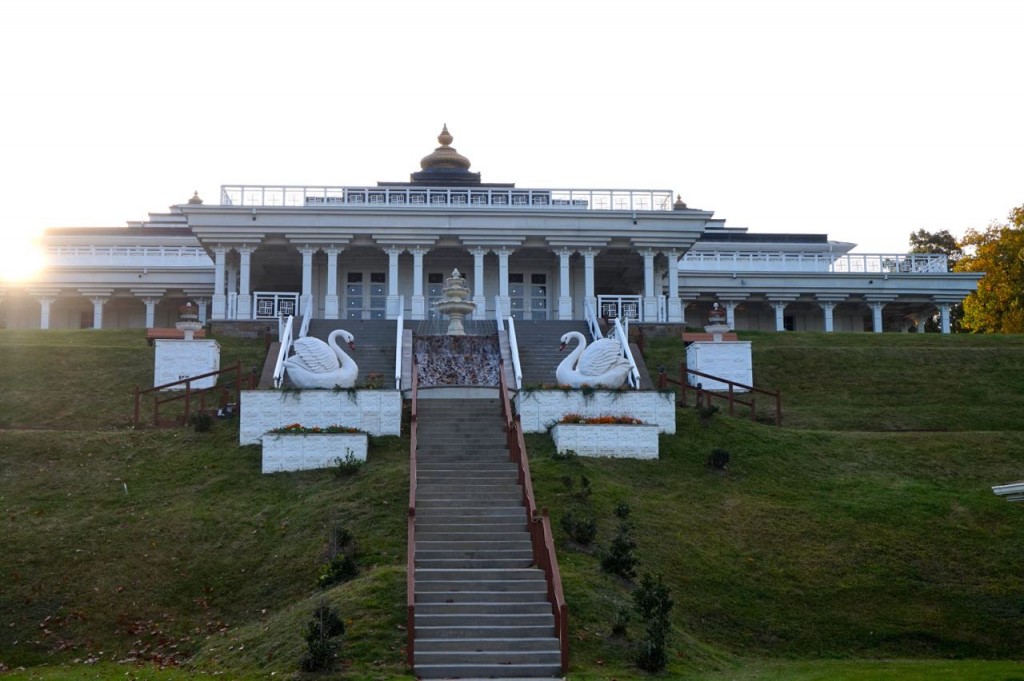
The Art Of Living Retreat Center
The retreat is designed on the principles of Vastu, a set of architectural and planning principles assembled by Maharishi Mahesh Yogi based on ancient Sanskrit texts. The exterior of the main hall reminds me of an elegant white palace that could be found in southern India, with its welcoming gardens, calming fountain, and giant swans guarding its gates. Wooden ceilings have a geometric layered pattern and a glass window in the middle of the ceiling, resembling an upside-down stairway to heaven.
Across the street is the main building where guest check-in. There is an unassuming reception desk managed by a couple of resident staff. They greet me with a big smile and a warm welcome. Mr. Venkat Srinivasan, Ph.D. (Manager of operations and guest experience), who has been here since the renovations began, officially welcomes me to the premises and takes me on a tour of the grounds.
Abundant Retreat Amenities
We first drive a few blocks to the spa building, the newest addition to the property. On the way, we pass by buildings that are rented out as apartments to the staff and students at Appalachian State University. There are also modest one-bedroom rooms rented out to visitors for an Ashram type retreat experience. Guests who are looking for solace and peace can stay here without the distractions of modern life, at a very affordable price.
The Retreats’ Spa
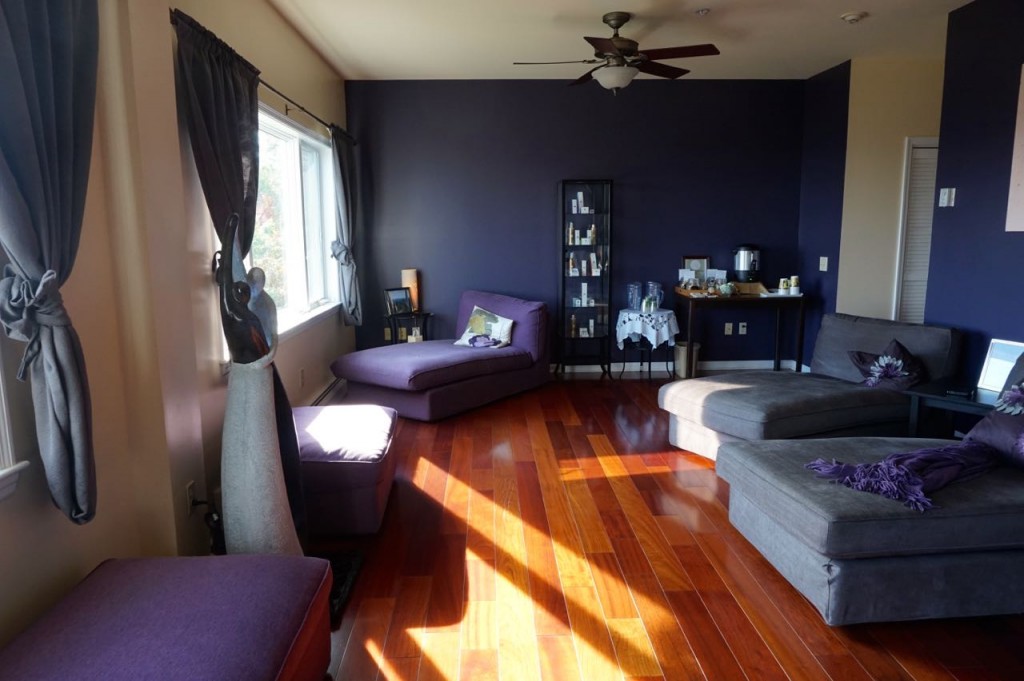
The Spa Rooms
The spa rooms at the Shankara Ayurveda Spa are comparatively more luxurious. King and double beds are decorated with hues of purple and white and offer unobstructed views of the forest and mountains beyond. There is a phone, television, and working desk, as well as a robe and slippers. Samples of toiletries come from Shankara, an upscale skincare line that embodies the ancient eastern science of Ayurveda, and the western state of the art anti-aging science. Ayurveda is a 5,000-year-old system of natural healing that has its origins in the Vedic culture of India. Plant-based treatments in Ayurveda may be derived from roots, leaves, fruits, bark, or seeds such as cardamom and cinnamon. 100% of the net profits of Shankara product sales are donated to global humanitarian projects through the International Association for Human Values (IAHV).
The spa service rooms and saunas are located only one floor up and offer traditional Ayurvedic treatments, such as Marma – where pressure points are activated to pacify the doshas; Basti – warm medicated oil massage for the joints; Netra Tarpana – eye detox for improving eyesight; as well as herbal exfoliations, Thai and Swedish massages, are offered at the spa. The therapists here are well trained in the traditional Ayurveda therapies and many of them have practiced all around the world.
I try the Abhyangya detoxifying herbal massage which involves a gentle full body oil massage in circular patterns. It aims to release stress and improve circulation. Regular treatments of Abhyangya also helps in weight loss. After unwinding at the sauna, I lounge in a chaise at the quiet room, sipping on a cup of soothing organic Balance Tea. Shankara blends and sells different kinds of Ayurveda teas that help with depression, anxiety, and restlessness.
Reflective Retreat Pursuits
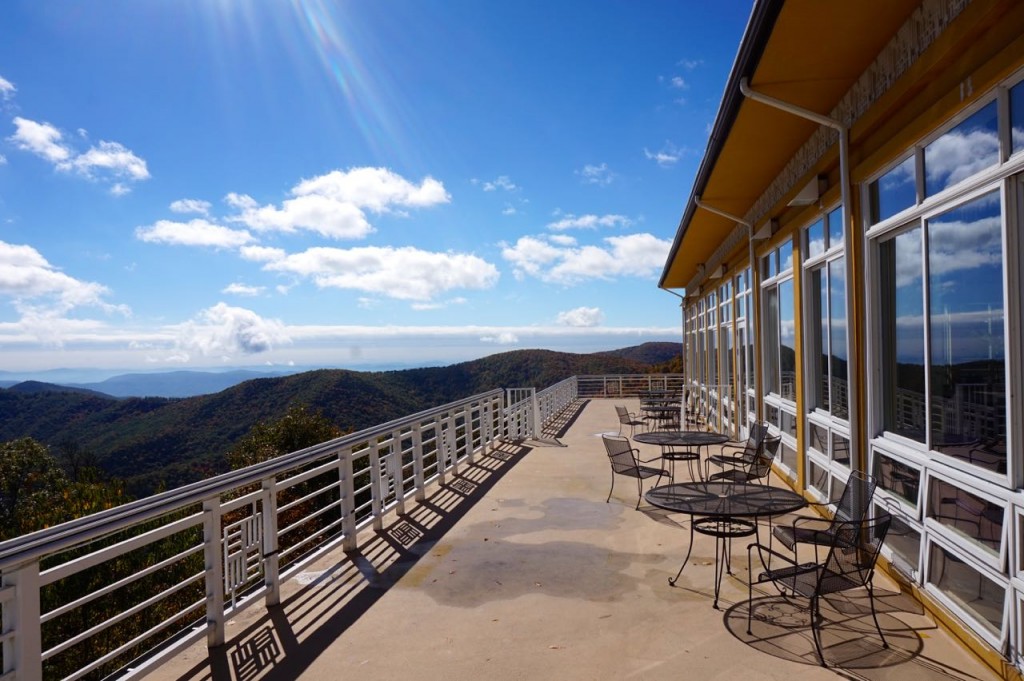
Visitors can enjoy free yoga and meditation lessons offered every morning and evening for anyone who wants to join in. The classes are good for any age and experience level. We stretch our joints, practice breathing techniques, and learn how to manage stress and be more peaceful. Some of the classes involve group discussions and guided meditations, most teachings act as reinforcements to keep a healthy mind, body, and spirit.
Art of Living offers a happiness program on the weekends where participants are taught the importance of being happy from the inside, and how it impacts immunity, health, energy, and personal relationships. There are also silence, meditation, detox, and weight loss retreats throughout the year.
For leisure, visitors can enroll in pottery workshops at the Clay Studio. Here you can learn how to make your own pottery on a clay wheel with a guided instructor. Extended workshops allow you to paint, bake, and finish the pieces, or the instructor would mail it to your home once ready. In November, there are special holiday ornament making classes with clay conducted by studio director and award-winning Appalachian State Fine Arts Pottery alumna, Laurie Caffery Harris.
Retreating to the Garden
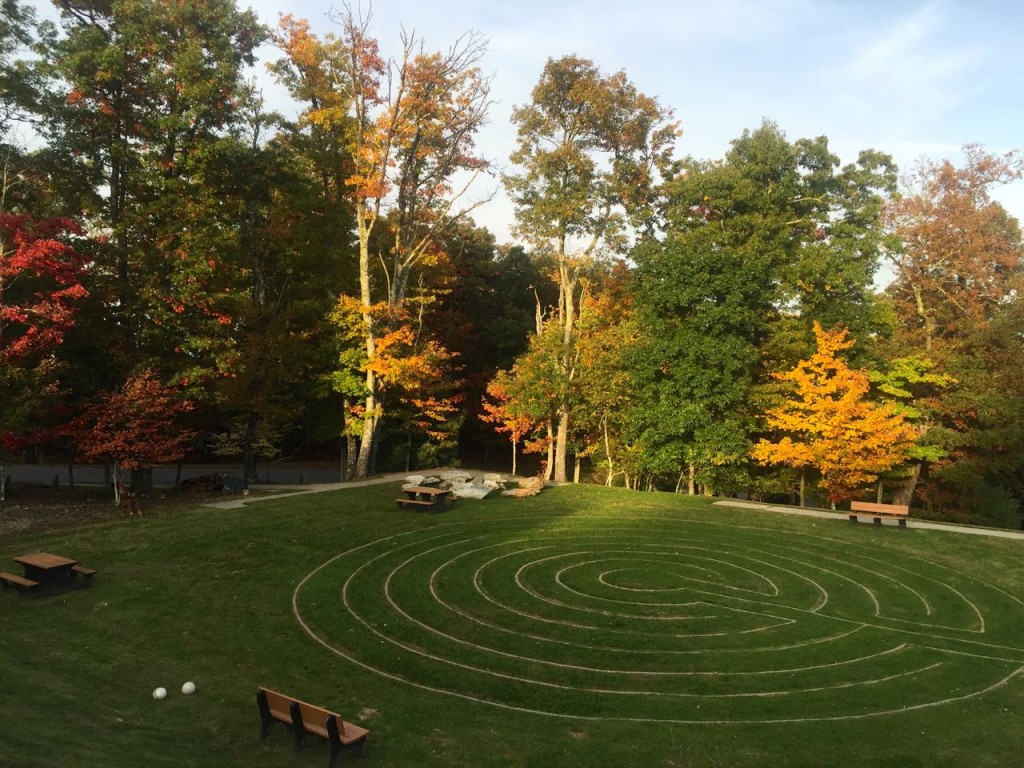
The Labyrinth
If you have a green thumb, you can volunteer at the organic vegetable farm. Resident farmer, Emily, a native of London, practices biodynamic agriculture, which emphasizes spiritual and mystical perspectives on the soil, plant growth, and livestock care. Farming methods include crop diversification, avoiding the use of chemicals, and consideration of celestial and terrestrial influences on the crops. All of the produce from this garden feeds into the kitchen, and you can see a fresh basket arriving at the dining hall each morning.
Finally, Srinivasan shows me a well-manicured labyrinth, historically been used as a meditation and prayer tool. The Labyrinth represents a journey to our own center and back again out into the world.
Being so close to nature at this secret retreat, solo and guided hikes are encouraged during your visit. I go through 3-miles of natural trails encountering various kinds of trees, shrubs, and mountain herbs, as well as occasional deer. The walk along the edge of the hill offers spectacular views of the fall color. Seeing how nature has shed its leaves and adjusted its appearance for the seasons right before me, I begin to recognize a subtle transformation happening inside of me.
After the clean air, I ingested with my newly learned breathing techniques, the release of stress from my body during the Ayurvedic massage treatment, the farm to table organic vegetarian diet in my system, and the communal gathering of spiritual companions, it’s hard to walk away not feeling any different than when you first came into the Shankara Ayurveda Spa at the Art of Living Retreat Center.
Last but not Least, The Cuisine
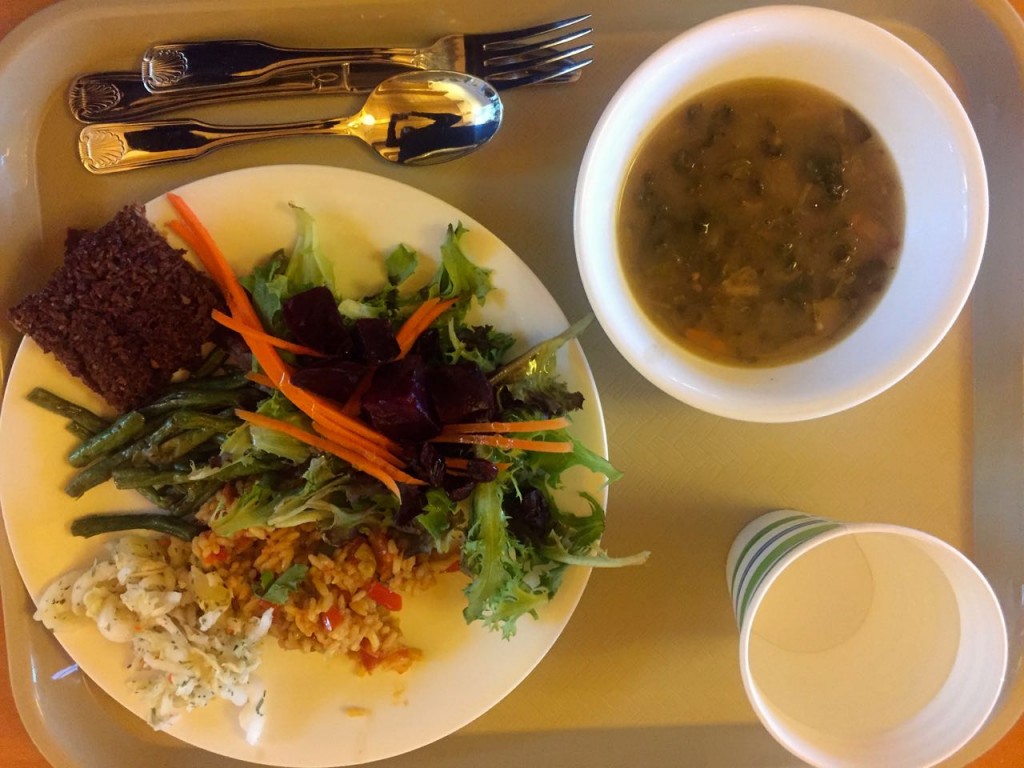
At this secret retreat, dinner reservations are not necessary. While staying at the Art of Living Retreat Center, breakfast, lunch, and dinner buffet is served at the main dining hall at set hours of the day. Emphasis is on healthy and wholesome vegetarian dining, while gluten and dairy-free choices are also available.
Executive chef, Raju, believes in invoking the taste buds with sweet, salty, sour, bitter, astringent, and pungent flavors that help feel satisfied while eating less. A typical meal would include soup, salad, protein, carbohydrates, vegetables, and dessert. Variations of cuisines are also great for the taste buds. On a Friday night, the theme could be Southern, serving okra and kale stew made with ingredients from the garden, vegetable Jambalaya, and maple molasses coconut bar; while on Saturday afternoon, we are offered a simple meal of Indian yellow lentils, aloo-gobi (potatoes and cauliflower curry), and basmati rice. There is a strict no alcohol and no meat policy on the campus.
After dinner, everyone heads downstairs to a communal hall for Satsang. In a spiritual context, this means a gathering with good or righteous companions. A few people pick up musical instruments, while others take over the mike and start singing in a slow melodic voice. The group joins in the chorus of short chants and songs that are pleasing to the ears, and invoke a meditative state in the room.